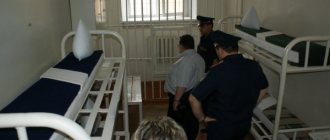Unfortunately, despite the fact that crime rates in the Russian Federation are an order of magnitude lower than in African, Asian, and some European countries, these figures are still catastrophic. At the same time, statistical indicators are extremely high for crime among minors, and according to indicators for the period from January to August 2021, more than 26,000 teenagers have already been identified who have committed crimes of varying severity. And by the end of the year, these figures will only increase, since the “peak loads” that occur during the holidays, pre-New Year and New Year holidays and weekends are still ahead. Due to the gravity of the prescribed regimes for keeping adult criminals in correctional institutions, it is, in principle, impossible to place persons under the age of majority in them. That is why the executive system of our country, for the purpose of correction and subsequent adaptation to society for teenage criminals, provides specialized institutions (colonies) of an educational type, which are an order of magnitude milder than the conditions in correctional colonies and prisons for adults. In this article we will talk about the peculiarities of keeping minors in educational colonies, as well as what makes them remarkable and what kind of nutrition teenagers who find themselves in this difficult situation receive.
The procedure for serving sentences in juvenile correctional colonies.
General provisions
The question of the reasons that push teenagers to commit certain crimes remains in the same rhetorical form. But even if a child (and 14-year-olds can still be called children) was guided by some primitive and base motives, applying to him the same correctional methods that are applied to capable adults is simply unacceptable, pointless, and moreover, inhumane. Therefore, the type of penitentiary institution under consideration - educational colonies - primarily pursues the goal not of punishing a young offender, but of instilling in him acceptable values accepted in a law-abiding social society, and eradicating the desire to repeat violation of the law, including, in principle, explaining what the law is and why it cannot be violated if parents or other guardians were unable to do so in advance. So, it is worth recalling that the current criminal legislation provides for appropriate liability for everyone who has reached the age of 14 for certain serious crimes, for other acts from the age of 16. Accordingly, persons aged 14 to 18 years are placed in educational colonies and, depending on the act committed, are assigned to one of 4 different detention regimes, which will be discussed further.
What is a juvenile correctional facility?
In essence, a children's educational colony is a variant of a correctional colony, with a regime similar to that in institutions for adult criminals. But the age of the prisoners and the need to apply a special approach to them related to the process of forming the child’s personality are taken into account. Specifically, such an approach should pursue the following goals:
- instill the habit of coexisting peacefully with other people;
- learn to evaluate yourself in comparison with other prisoners;
- provide education within the framework of basic standards and additional classes of interest;
- teach skills that can help you earn a living without breaking the law;
- to involve in public life through creativity and amateur performances.
Modes
Based on Article 132 of the Criminal Executive Code of the Russian Federation, there are four modes of serving sentences in educational colonies: regular, lightweight, preferential and strict. The distribution of juvenile offenders according to these conditions depends on the actual severity of the acts they committed, which in turn directly affects the term of imprisonment. And the features of each of the four regimes are explained in Article 133 of the Penal Code of the Russian Federation as follows:
"Regular"
Prisoners sentenced to imprisonment live in dormitories and receive additional rights to:
- monthly expenses (from personal accounts) for basic necessities and basic food products in established domestic stores in the amount of up to 10,800 rubles;
- eight short-term and four long-term dates throughout the year.
"Lite"
In accordance with the provisions of Article 132 of the Penal Code of the Russian Federation, prisoners who do not have any penalties and who have duly demonstrated diligence in study and work are transferred to light conditions in the presence of the following circumstances:
- male adolescents sentenced to imprisonment for the first time, and female adolescents (without restrictions) after being in normal conditions for 3 months;
- after 6 months for male representatives who have experience of imprisonment behind them.
This category of prisoners is granted the right to monthly expenses in the amount of 11,400 rubles, as well as 12 short and 4 long visits, including with the permission of the administration, long visits can be carried out outside the territory of the institution.
"Preferential"
Provided for the preparation of persons who will soon receive release if they are already being held in light conditions. These benefits are characterized primarily by the absence of restrictions on the monthly budget and the absence of restrictions on the number of short-term dates (long-term ones are limited to six), which is extremely significant even in such loyal institutions. In addition, with the permission and resolution of the administration, these prisoners may be given the right to live in a dormitory outside the colony, but with appropriate supervision, which does not provide for actual security, and this in turn leads to obtaining permission to wear civilian clothes and free spending personal funds.
"Strict"
Persons who have repeatedly violated criminal law, or persons who have been recognized as malicious violators of the internal regulations of an educational institution, are placed or transferred to these conditions. It is worth noting that if there are no complaints within 6 months, the prisoner can be transferred to normal conditions. The fundamental rights indicated above receive the following restrictions corresponding to the regime:
- living not in a dormitory, but in an isolated room;
- monthly expenses are reduced to 9,600 rubles;
- reduction of short-term dates to 6, and long-term dates to 3. in year.
Minors sentenced to imprisonment as an object of penitentiary research
The need to single out this social stratum for independent penitentiary research is caused by the following reasons.
Firstly, the importance and scale of tasks to protect the health and life of the younger generation, and consequently, the formation of state policy to protect the rights and legitimate interests of children and adolescents.
Secondly, the peculiarities of correction and correction of the behavior of juvenile criminals, due to the specifics of their upbringing and life activities (relatively limited period of personality formation, variability of social positions, limited legal capacity, etc.), characteristics of personal, social-group, psychological and other characteristics.
Thirdly, the high criminal activity of adolescents is closely related to these characteristics.
At the same time, the most important thing for identifying juvenile offenders as an independent object of study is that the penitentiary characteristics of this category are the very formula of the law, which in certain chapters of the Criminal Code of the Russian Federation and the Penal Code of the Russian Federation established the features of criminal liability and punishment of persons of this contingent, established age criteria for separating it into a special demographic group of criminals, as well as the procedure for serving and releasing punishment. Moreover, if we take into account that its lower age limits - 14 years and upper - 18 years are associated with the requirements of developmental psychology and criminal policy, then it becomes clear how significant the difficulties are in studying juvenile delinquency, the personality of the criminal, and developing measures for this age group of persons prevention and criminal legal response.
Persons who commit illegal acts at an early age, later, as a rule, are much more difficult to correct and ultimately constitute the main reserve for adult and recidivism. At the same time, the aggravation of the problem of family dysfunction against the general background of poverty and constant need, the moral and social degradation occurring in families, lead to negative consequences. Basically, in these families, drunkenness, drug abuse, promiscuity in sexual relations flourish, and there are no moral principles or basic culture. As a result, there is a rapid increase in extremely dangerous violent crimes committed by teenagers and even children.
It must be stated that juvenile delinquents determine the moral level and appearance of society, its development and social maturity.
If we consider only the penitentiary aspect, it should be noted that, ensuring that minors serve a sentence of imprisonment separately from adult convicts, the legislator proceeds from the following principles of the penal legislation of the Russian Federation:
- differentiation and individualization of execution (serving) of punishment;
- rational use of coercive measures, means of correction and stimulation of law-abiding behavior;
- combining punishment with corrective action.
This refers, first of all, to the separate detention of juvenile convicts, who, as a rule, have much less criminal experience than adult convicts, which can have a negative impact on them.
In this regard, certain legislative provisions play an extremely important role, which provide for different procedures and conditions of detention of persons serving sentences in educational colonies.
Educational colonies are a type of correctional institutions designed to hold minors sentenced to imprisonment.
In the system of correctional institutions, educational colonies occupy a special place, since the main factor determining the conditions for serving sentences in these colonies is the minority of offenders, which, on the one hand, requires more preferential conditions of detention compared to adult criminals, and on the other hand, opens up wide educational opportunities. - pedagogical opportunities for the return of convicted minors to a law-abiding working lifestyle in society and the moral character of a person and citizen.
According to Art. 88 of the Criminal Code of the Russian Federation and Art. 74 of the Penal Code of the Russian Federation, imprisonment is imposed on minors for a term of not more than 10 years and they serve it in educational colonies. Convicts may also be kept in educational colonies until they reach the age of 19.
At the same time, isolated sections may be created in educational colonies, functioning as general regime correctional colonies, for the detention of convicts who have reached the age of 18 while serving their sentence. The procedure for creating these areas is determined by the federal executive body that carries out the functions of developing and implementing state policy and legal regulation in the field of execution of criminal penalties.
Let's look at some criminal statistics. According to the 1994 census of convicts, 3.2% of all persons serving imprisonment were kept in educational colonies. This figure, it would seem, is not so great. However, for society, the fate of every juvenile offender is of utmost importance. Serving a sentence in prison as a minor will lead the convicted person either to a firm conviction that the most correct thing is a positive lifestyle, solving problems within the framework of the law, or to a relapse into crimes.
According to the 1994 census of convicts, 95.8% in educational colonies were male and 4.2% female, 97.7% of convicts were able to work, 6.8% had general secondary or special secondary education. 45.2% of convicts did not have certain occupations at the time of committing the crime.
Over the years, these figures have not changed significantly. As of July 1, 2010, 4.8% of all persons serving imprisonment are kept in educational colonies. Males make up 92.4%, females – 7.6%; 86% of convicts are able to work; more than 20% have general secondary or special secondary education; 68% of convicts did not have certain occupations at the time of committing the crime.
The information provided characterizes convicts held in educational colonies as generally less criminalized than adult convicts serving imprisonment, but individual indicators have a decisive correlating value and in this regard are a mirror of the socio-economic policy pursued by the state.
The conditions for serving sentences in educational colonies are more varied than in correctional colonies. In accordance with Art. 132 of the Penal Code of the Russian Federation they are divided into ordinary, lightweight, preferential and strict. This creates the necessary prerequisites for effective correctional influence on different categories of juvenile convicts.
Convicts newly admitted to educational colonies are kept under normal conditions. The exceptions are minors who have committed intentional crimes while serving their sentences, as well as persistent violators of the established procedure for serving their sentences, transferred from easier and preferential conditions.
Under normal conditions, male convicts serving imprisonment for the first time, as well as all female convicts, are held for at least three months, and male convicts who have previously served imprisonment for at least six months. After the expiration of the specified periods, in the absence of penalties for violations of the established procedure for serving the sentence, and a conscientious attitude to work and study, convicts are transferred from ordinary conditions to lighter ones.
At the same time, a transfer to strict conditions of serving a sentence may follow from ordinary conditions. It occurs when the convicted person is recognized as a malicious violator of the established procedure for serving the sentence.
Convicts serving their sentences in light conditions are transferred to preferential conditions for serving their sentences in order to prepare for parole. These conditions are provided only in educational colonies in order to create an environment conducive to social adaptation and the prevention of relapse after the release of a convicted person from a correctional institution.
If they are found to be malicious violators of the established procedure for serving a sentence, convicts serving their sentences in light conditions, depending on the nature of the violations and the identity of the perpetrator, are transferred to further serve the sentence in ordinary or strict conditions.
Convicts serving their sentences under preferential conditions, if they are recognized as persistent violators of the regime, are transferred to normal conditions of serving their sentences. In this case, a repeated transfer to preferential conditions may follow no earlier than six months from the date of return to normal conditions.
Convicts sentenced to imprisonment for intentional crimes committed while serving imprisonment, as well as those transferred to strict conditions from ordinary or simplified conditions of serving a sentence who are recognized as malicious violators of the established procedure for serving a sentence, serve their sentences in a correctional colony under strict conditions. Convicts are kept in strict conditions for at least six months, and then, in the absence of penalties for violations of the established procedure for serving the sentence, and a conscientious attitude to work and study, they can be transferred to ordinary conditions.
Transfer from one conditions of serving a sentence to another is carried out by the head of the educational colony on the recommendation of the educational council of the colony or the council of educators of the detachment in which the convicted person is enrolled.
The conditions for serving a sentence are significantly changed by the transfer of convicts held in educational colonies to preferential conditions. Convicts placed in preferential conditions live in dormitories, located, as a rule, outside the educational colony, without security, but under the supervision of the colony administration.
Such conditions are designed to stimulate the acquisition and strengthening of socially useful connections, to facilitate the search for a future place of residence, work or study.
Features and difficulties
It is worth noting that, in accordance with Article 139 of the Penal Code of the Russian Federation, a person who, at the time of reaching adulthood, has not fully served the prescribed term of imprisonment, may remain within the walls of an educational colony, but maximum until he reaches 19 years of age (previously it was up to 21 years of age) . Otherwise, immediately upon reaching the age of 18, the prisoner is sent to an adult correctional facility specific to the crime he committed. This principle is based on the fundamental function that was mentioned at the beginning of the article and is aimed at consolidating the results obtained in the upbringing and social adaptation of an adult.
The reduction of the maximum permissible age from 21 to 19 years was met with hostility by many lawyers. This is due to the fact that, along with age, the motivation of juvenile delinquents has also been reduced, since in cases where a teenager at the age of 16 is sentenced, for example, to five years in prison, then in almost any case he will end up in an adult prison with real “criminals” . And this circumstance can put an end to the minor’s desire to improve and adapt to society, since, in fact, he will be forced to adapt to the new conditions of detention in an adult colony, which can also neutralize all attempts to re-educate him and instill appropriate values. Therefore, the question so often arises about the appropriateness of the changes mentioned above.
The second question that relatives of the inmates of the institutions in question often ask themselves, since juvenile delinquents are not always orphans or those who have become “conditional orphans” with living parents, is the desire to find out what they feed in educational colonies and enough Is this for the normal functioning and healthy growth of a minor. Even without the latest changes dating back to 2021 and aimed at a complete revision of the diet for prisoners in correctional institutions, the category of minors in question always ate sufficiently and, according to many, their diet was much better than in orphanages. And since the entry into force of FSIN Order No. 696 of September 2, 2021, the nutrition system in all penitentiary institutions has received significant improvements, which, subject to compliance with these innovations, should once and for all remove the issue of malnutrition among juvenile prisoners from the agenda.
Who are they for?
In juvenile detention centers, girls and boys are kept separately. There are only two women's colonies in Russia, and 21 men's colonies.
The court sends people to such colonies for committing crimes specified in a special part of the Criminal Code of the Russian Federation. In this case, they can be sent to a colony from the age of 14 if the court decides that the child’s living conditions and his environment are not conducive to his correction. Based on this, it will be recognized that a suspended sentence is inappropriate, but it is necessary to send him to an educational colony.
Modes and conditions of detention
In most colonies today, living conditions have improved. Large barracks were replaced by separate rooms, each containing 4-5 people. The rooms have a TV, refrigerator and desk. There are several showers in the corridor. It is also important that teenagers are not involved in duty, they only study or work.
Upon arrival at the colony, each prisoner undergoes a two-week quarantine. At this time, doctors examine him, he talks with a psychologist and gets used to the new place.
At what age can you legally get there?
A teenager can be sent to a children's colony starting from the age of 14. But the court can do this only in exceptional cases. The crime (its severity), the conditions under which it was committed, the presence of relapses and, in general, the personality of the offender are taken into account. The main factor on the basis of which a sentence of imprisonment is imposed is the social danger of the crime and the criminal himself.
Imprisonment in a colony is never applied to minors who have committed crimes of minor or moderate gravity for the first time.
For crimes of minor and medium gravity committed by a teenager under the age of 16, the punishment cannot be more than 6 years of imprisonment, and for serious crimes - more than 10 years.










